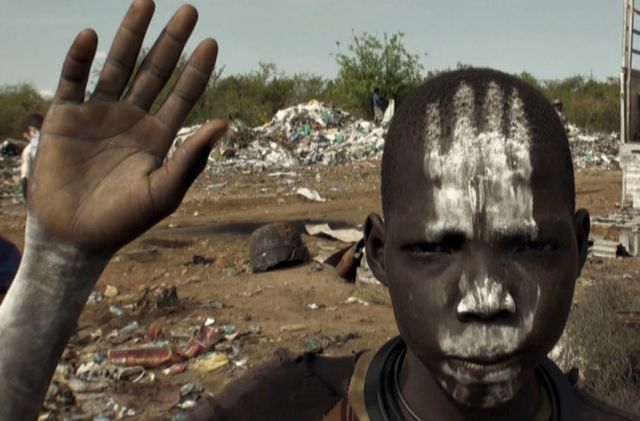Documentary Shows How Outsiders Have Wreaked Havoc In Sudan
By Joel Wicklund in Arts & Entertainment on Aug 28, 2015 9:45PM

Photo courtesy BBC Worldwide North America.
A potent, damning and despairing look at the enduring impact of imperialism in Africa, We Come as Friends views the ongoing conflict between Sudan and newly-created South Sudan as simply the latest problem created by unending influence of white men on the continent. Far from a remote, scholarly work, however, this documentary takes a "boots on the ground" (and sometimes in the air) approach, which offers a visceral, intimate and often very strange view.
The title of the film by director Hubert Sauper (Darwin's Nightmare) casts foreign influences as outsiders. As in science fiction, these alien forces initially seem like benign and even constructive visitors, only to wreak havoc in the end. And it's hard to argue they haven't created havoc. Whether the interests have been commercial and industrial (Sudan's oil reserves are coveted globally), political or theological (Muslim vs. Christian dynamics shaped the civil war in Sudan), so much of the trouble in the region can be traced back centuries to invaders, resource raiders, and even well-intentioned evangelicals and humanitarians.
Sauper filmed We Come as Friends just as South Sudan was emerging as an independent nation—though the movie pointedly questions just how independent it can really be. And while the heavy U.S. influence on South Sudan is evident, the movie is equally skeptical of China's influence on the now-separate Sudan in the north. The presence of Chinese oil workers gives the film one of its more bizarre sequences. The nationalistic oilmen do some verbal saber-rattling while clips from Star Wars, Star Trek, and 2001 play in the background. You're left wondering if Sauper selected those films to support his theme, but what is clear is that the workers' attitudes are those of disrespectful strangers.
Another memorable group of disruptive visitors is a band of Texas evangelicals, claiming to see purity in Africa, even as their actions confirm the arrogant history of colonial settlers. One of the evangelicals relates his new neighbors' objections when he put up a fence on what used to be open land where their goats could graze. He recalls telling them, "You were here first. But now there's a fence." Then, with horrifying obliviousness, he grins and says, "They got over it."
Less obviously destructive in his presence is a British bomb disposal expert, who is clearly saving some lives as he risks his own. But he also displays his own cultural prejudices in pondering why Africa is so dependent on outside aid and industry. "There must be a reason they're still 200 years behind the rest of the world," he suggests. An African child who has befriended him hugs the man, while the child's mother looks in from outside with anything but trust for the Englishman in her eyes.
Sauper gets more overtly critical looks and remarks from Sudanese natives as he and his minimal crew travel in a lightweight aircraft the filmmaker designed himself. That mode of travel adds an adventurous element to the film, but to Sauper's credit, he never lets that get in the way of his grim challenge to all the existing "answers" to the problems in Sudan—and in the larger sense, much of Africa.
Individuals from the native population and the current foreign presence speak for themselves, though Sauper adds his own thoughts mainly in opening narration and through adroit editing of his compelling footage. Sauper essentially asks one big question: How long will we let history repeat itself?
We Come as Friends. Directed and narration written by Hubert Sauper. 110 mins. In English, French, Chinese, Arabic, Dinka, Nuer, Bari and Zande, with English subtitles. No MPAA rating.
Opens Friday, Aug. 28 at Facets Cinémathèque